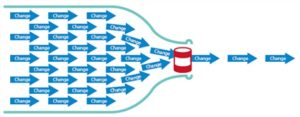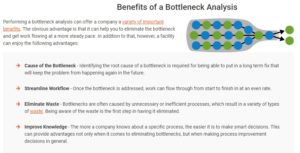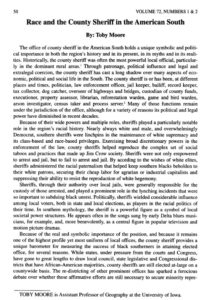Go Lean Commentary
Let’s separate …
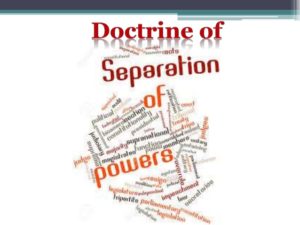 … let’s take all the assets-powers-responsibilities and divvy them up between the one party and the other. (Sounds like a Country-Western Break-up song, right? See sample in the Appendix VIDEO below). But, in this case, let’s do this separation, not so that we can go our separate ways, but rather let’s do this separation so that we can come together:
… let’s take all the assets-powers-responsibilities and divvy them up between the one party and the other. (Sounds like a Country-Western Break-up song, right? See sample in the Appendix VIDEO below). But, in this case, let’s do this separation, not so that we can go our separate ways, but rather let’s do this separation so that we can come together:
- You bring the brawn, I bring the brains … let’s make lots of money
- You bring the bread, I bring the meat … let’s make a sandwich
- You bring the seafood, I bring the okra … let’s make a gumbo
This is the reality of a confederation or a confederacy. According to the 2013 book Go Lean…Caribbean (Page 63), which serves as a roadmap for the introduction of the Caribbean Union Trade Federation (CU), this confederation tactic is the best hope to reform-and-transform the failing Caribbean to finally have a hope for prosperity:
A federation, by definition is a political entity characterized by a union of partially self-autonomous states or regions united by a central (federal) government. In a federation, the self-governing status of the component states, as well as the division of powers between them and the central government, are typically constitutionally entrenched and may not be altered by a unilateral decision of the states. For the Caribbean, the branding is a Trade Federation, thereby highlighting the limited scope of the entity’s governance. Its prime directive is to enable the economic engines of the region, and thereafter protect their security interests.
The Caribbean Union Trade Federation will be coextensive with the member-states of the CU. This indicates that the governmental units of the state governments will share the same boundaries of the Trade Federation. Jurisdiction of the two entities will therefore co-exist for the governance of the region. The tactical plan is to specify a separation-of-powers between the entity of the technocratic CU versus the governmental entities of the member-states (and their municipal authorities).
Our best example of a confederacy – and the Separation of Power – in antiquity was the nascent United States of America (1776 – 1789). The best example of confederacy in modern times is the European Union. These entities did exactly what this commentary is advocating:
Separate the assets-powers-responsibilities so that the different parties perform different duties to execute the governing demands of the implied Social Contract … with the consent of the governed.
(Implied Social Contract = citizens surrender some of their freedoms and submit to the authority of the State in exchange for protection of remaining natural and legal rights).
 As related, we publish a series of teaching commentaries every month – as a supplement to the Go Lean book. This month, we are examining the thesis that we, in the Caribbean, can be Better Than America, in words (law) and in action. The issue of confederation is a valid consideration in this month’s teaching subject on the perceived ‘masterpiece’ of the US Constitution and the Bill of Rights – the first 10 Amendments that were proposed-ratified right at the start of the accession of the new Constitutional Republic (1791). In earlier commentaries of this series, we detailed the anti-tyranny provisions and criminal proceedings of the Bill of Rights; now we look at the Separation of Powers provisions, the Ninth and Tenth Amendments of the US Constitution. These provide the legal premise as follows:
As related, we publish a series of teaching commentaries every month – as a supplement to the Go Lean book. This month, we are examining the thesis that we, in the Caribbean, can be Better Than America, in words (law) and in action. The issue of confederation is a valid consideration in this month’s teaching subject on the perceived ‘masterpiece’ of the US Constitution and the Bill of Rights – the first 10 Amendments that were proposed-ratified right at the start of the accession of the new Constitutional Republic (1791). In earlier commentaries of this series, we detailed the anti-tyranny provisions and criminal proceedings of the Bill of Rights; now we look at the Separation of Powers provisions, the Ninth and Tenth Amendments of the US Constitution. These provide the legal premise as follows:
Ninth Amendment to the United States Constitution
- The enumeration in the Constitution, of certain rights, shall not be construed to deny or disparage other [rights] retained by the people.[93]
The Ninth Amendment declares that there are additional fundamental rights that exist outside the Constitution. The rights enumerated in the Constitution are not an explicit and exhaustive list of individual rights. It was rarely mentioned in Supreme Court decisions before the second half of the 20th century, when it was cited by several of the justices in Griswold v. Connecticut (1965). The Court in that case voided a statute prohibiting use of contraceptives as an infringement of the right of marital privacy.[116] This right was, in turn, the foundation upon which the Supreme Court built decisions in several landmark cases, including, Roe v. Wade (1973), which overturned a Texas law making it a crime to assist a woman to get an abortion, and Planned Parenthood v. Casey (1992), which invalidated a Pennsylvania law that required spousal awareness prior to obtaining an abortion.
Tenth Amendment to the United States Constitution
- The powers not delegated to the United States by the Constitution, nor prohibited by it to the States, are reserved to the States respectively, or to the people.[93]
The Tenth Amendment reinforces the principles of separation of powers and federalism by providing that powers not granted to the federal government by the Constitution, nor prohibited to the states, are reserved to the states or the people. The amendment provides no new powers or rights to the states, but rather preserves their authority in all matters not specifically granted to the federal government.[117]
Congress has sometimes circumvented the Tenth Amendment by invoking the Commerce Clause in Article One[118] or by threatening to withhold funding for a federal program from non-cooperative States, as in South Dakota v. Dole (1987).
Source: Retrieved November 26, 2019 from https://en.wikipedia.org/wiki/United_States_Bill_of_Rights
The historicity of the US shows that they did not always appreciate the concept of Separation of Powers. Though the Bill of Rights was fully ratified in 1791, these provisions had no bearing on the States, until starting around the 1860’s with the passage of the Fourteenth Amendment. Yes, for at least 70 years – and even longer in some cases – the country had a divergent sets of constitutional rights: some at the federal level and totally different ones at the State level. See this point as pronounced here from the same encyclopedic reference as above:
Although Madison’s [- the original author -] proposed amendments included a provision to extend the protection of some of the Bill of Rights to the states, the amendments that were finally submitted for ratification applied only to the federal government. The door for their application upon state governments was opened in the 1860s, following ratification of the Fourteenth Amendment. Since the early 20th century both federal and state courts have used the Fourteenth Amendment to apply portions of the Bill of Rights to state and local governments. The process is known as incorporation.[3]
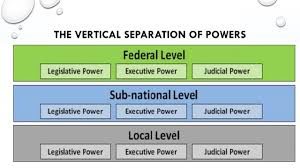
So there you have it; the masterpiece of a legal framework that was the US Constitution and the Bill of Rights was not so perfect a masterpiece after all. However, the beauty of the US Constitution History is not its start; it’s the journey, and the finish.
This is where and how the Caribbean can forge a better legal legacy – we can make our own masterpiece now at the start of our federal government, and not have to endure the same long train of abuses to get to this destination. We can do better in our Caribbean homeland; this is the quest of the Go Lean movement to reform and transform Caribbean society. The revelation of an ugly history for the Bill of Rights is the purpose of this November 2019 blog series. The full catalog of this series on the Bill of Rights is detailed as follows:
- Better than the Bill of Rights: First Amendment – We can do better
- Better than the Bill of Rights: Second Amendment – No slavery legacy
- Better than the Bill of Rights: Third & Fourth Amendments – Remember, Justice First
- Better than the Bill of Rights: Fifth & Sixth Amendments
- Better than the Bill of Rights: Seventh & Eighth Amendments
- Better than the Bill of Rights: Ninth & Tenth Amendments
As this series refers to the need for a comprehensive roadmap for elevating the societal engines – economics, security and governance – of the 30 Caribbean member-states, this entry focuses more on the need for a Separation of Powers provisions. We do not need jurisdictional confusion between federal authorities and those of the member-states; they need to separate, yes, so as to come together for an integrated solution. See how this is presented visually in this photo here – a facsimile of Page 71 of the Go Lean book:
(Click on photo to Enlarge)
In this photo, notice all the “Exclusive = Yes” federal departments. This means, according to the verbiage in the book, as related in 1 example regarding the separated-exclusive Depository Insurance & Regulatory Authority:
The scope and jurisdiction of this Agency is exclusive in the region for Caribbean dollar activity.
This structure is repeated, again and again in the book; of the 51 identified federal agencies, 28 are chartered as exclusive authority or jurisdiction. This is good for regional governance; this means local member-states do NOT have to maintain duplicate agencies to do the same functions that can be technocratically delivered at the federal level. Consider these further examples – again, not the exhaustive list:
| Securities Exchange Regulatory Authority | Coast Guard / Naval Authority |
| Witness Protection (WitSec) | Trade / Anti-Trust Regulatory Commission |
| Patents, Standards and Copyrights Authority | Postal Services |
| Communications & Media Authority | Aviation Administration & Promotions |
| Student Loan Funding | Medical Licenses & Standards |
This foregoing information is from 1 page of the Go Lean book, while in fact there are 370 pages of turn-by-turn directions on how to reform and transform the economic, security and governing engines for the Caribbean region and their member-states. This roadmap includes the new community ethos (attitudes and values) that must be adopted; plus the executions of new strategies, tactics, implementations and advocacies to deliver the obligations of the Social Contract. In fact, this is the actual title of one advocacy in the Go Lean book. Consider the specific plans, excerpts and headlines here from Page 222, entitled:
10 Ways to Better Manage the Social Contract
| 1 | Lean-in for the Caribbean Single Market Confederation Treaty This treaty allows for the unification of the region into one market of 42 million people across 30 member-states, and thus creates an economic zone of over $800 Billion (c. 2010). The sheer size of this single economy allows for more government efficiencies and effectiveness, as should be expected by citizens of a modern democracy. This expectation is pegged to the implied Social Contract where citizens surrender some of their freedoms and submit to the authority of the State in exchange for protection of remaining natural and legal rights. The CU ascension creates another layer of government hierarchy for the region, but the implication is the same: there is a Social Contract of deliverables and responsibilities that the CU must execute, in the sphere of economic empowerment and homeland security. |
| 2 | Economics of Colonies
… The CU Social Contract calls for a re-boot in which this region will not just consume, but also create/produce. |
| 3 | Non-Profitable Endeavors
[18th Century] economist Adam Smith, recommended further that governments not impede the wheels of commerce, (laissez-faire), rather concentrate more on endeavors not financially feasible for private enterprises, like early childhood education, standing armies, public safety, etc. … The CU proposes public-domain services that can expand the economics (income/jobs) for the region, such as the prison industrial complex, student loans for tertiary education and licenses for private security/1st response services. |
| 4 | Security of Colonies
History has shown that there must be security solutions or “bad actors” will exploit successful economic engines for illicit gains. This was the case with the Pirates of the Caribbean plundering the booty of Spanish treasure-laden ships, and also the Outlaws of the Old West robbing the yields of prospectors from the Gold Rushes (i.e. California, Alaska). The CU assuages regional terroristic threats and prosecutes economic crimes. |
| 5 | Infrastructure
Roads, bridges, sewer systems, and other infrastructure projects cannot always function as profit centers, many times these endeavors must be invested in for the sake of the greater good, without the rationale of profit. This expectation is economically unrealistic for smaller states, but with the scale of the entire CU, viable solutions can be put in place. |
| 6 | Medical / Heath Endeavors |
| 7 | Education Optimizations |
| 8 | Failed State Indices Movements |
| 9 | Technology and Efficiency
The CU will foster the art and science of technology deployments. This includes the embrace of advanced project management and lean organizational initiatives (Six Sigma, Agile, PMI, CMM, etc.), resulting in efficient deliveries. |
| 10 | Canadian Provincial Governments Model |
The reasons for Caribbean Push and Pull are tied to deficiencies in the economic and security engines; think jobs or crime. But governance is important too. The Go Lean roadmap posits that the deployment of optimized administrative systems will help Caribbean governments to govern better … and at a lower cost.
This theme – improving governing mechanics and systems – has been related in many previous Go Lean commentaries. See a sample list here:
| https://goleancaribbean.com/blog/?p=18524 | e-Money Solutions for the Caribbean Dollar – Now One Step Closer |
| https://goleancaribbean.com/blog/?p=17925 | Learning from Previous Failures for Infrastructure Developments |
| https://goleancaribbean.com/blog/?p=17500 | Continuity of Business: Learning from System Failures |
| https://goleancaribbean.com/blog/?p=17282 | Way Forward – For Independence: Territory Realities |
| https://goleancaribbean.com/blog/?p=16848 | ‘Two Pies’ for a New Caribbean – Federal vs Member-State |
| https://goleancaribbean.com/blog/?p=15858 | A Regional Network – A Mandate for a New Caribbean |
| https://goleancaribbean.com/blog/?p=15075 | e-Government 3.0 – Systems for Improved Governance |
| https://goleancaribbean.com/blog/?p=13999 | First Steps – Deputize the CU for Regional Governance |
| https://goleancaribbean.com/blog/?p=13524 | Future Focused – e-Government Portal 101 |
| https://goleancaribbean.com/blog/?p=10771 | Logical Addresses – ‘Life or Death’ Consequences |
| https://goleancaribbean.com/blog/?p=7991 | Transformations: Caribbean Postal Union – Delivering the Future |
| https://goleancaribbean.com/blog/?p=6965 | Secrecy, corruption and conflicts of interest pervade state governments |
| https://goleancaribbean.com/blog/?p=1112 | The problem with Bad Governance is not Money; its Bad Governance |
| https://goleancaribbean.com/blog/?p=888 | Better Governance – Take the Town Square Digital and Reinvent |
Yes, we can be Better Than America; but it is not easy; it involves some heavy-lifting that many times America itself did not want to do. Just think, all the reasonable accommodations they subsequently made to “live and let live”. We take it for granted today, but for previous generations, this was a “tall order”. This is how we can be better … now, by fully embracing the mandate for a pluralistic democracy, now.
Imagine: Civil Rights without a Civil War; Gender Equity without a Battle of the Sexes.
This is how we can do better than America’s Bill of Rights. We can just give people their rights, with no tyranny attached. We urge all Caribbean stakeholders to lean-in to this roadmap to make our homeland a better place to live, work and play. 🙂
About the Book
The book Go Lean…Caribbean serves as a roadmap for the introduction and implementation of the technocratic Caribbean Union Trade Federation (CU), for the elevation of Caribbean society – for all member-states. This CU/Go Lean roadmap has these 3 prime directives:
- Optimization of the economic engines in order to grow the regional economy to $800 Billion & create 2.2 million new jobs.
- Establishment of a security apparatus to ensure public safety and protect the resultant economic engines.
- Improve Caribbean governance to support these engines, including a separation-of-powers between the member-states and CU federal agencies.
The Go Lean book provides 370-pages of turn-by-turn instructions on “how” to adopt new community ethos, plus the strategies, tactics, implementations and advocacies to execute so as to reboot, reform and transform the societal engines of Caribbean society.
Download the free e-Book of Go Lean … Caribbean – now!
Who We Are
The movement behind the Go Lean book – a non-partisan, apolitical, religiously-neutral Community Development Foundation chartered for the purpose of empowering and re-booting economic engines – stresses that reforming and transforming the Caribbean societal engines must be a regional pursuit. This was an early motivation for the roadmap, as pronounced in the opening Declaration of Interdependence (Pages 12 – 13):
xi. Whereas all men are entitled to the benefits of good governance in a free society, “new guards” must be enacted to dissuade the emergence of incompetence, corruption, nepotism and cronyism at the peril of the people’s best interest. The Federation must guarantee the executions of a social contract between government and the governed.
xvi. Whereas security of our homeland is inextricably linked to prosperity of the homeland, the economic and security interest of the region needs to be aligned under the same governance. Since economic crimes … can imperil the functioning of the wheels of commerce for all the citizenry, the ccidence of this Federation must equip the security apparatus with the tools and techniques for predictive and proactive interdictions.
xxiv. Whereas a free market economy can be induced and spurred for continuous progress, the Federation must install the controls to better manage aspects of the economy: jobs, inflation, savings rate, investments and other economic principles. Thereby attracting direct foreign investment because of the stability and vibrancy of our economy.
Sign the petition to lean-in for this roadmap for the Caribbean Union Trade Federation.
—————
Appendix VIDEO – Collin Raye – Make Sure You’ve Got It All (1998) – https://youtu.be/SDsOHyMZr5U
Published on Nov 7, 2011 – From the Collin Raye album ‘The Walls Came Down’. Written by Bill Anderson and Steve Wariner. No copyright infringement is intended.
- Category: Music
- Song: Make Sure You’ve Got It All
- Artist: Collin Raye
- Album: The Walls Came Down
- Licensed to YouTube by: SME (on behalf of Epic/Nashville); Sony ATV Publishing, CMRRA, BMI – Broadcast Music Inc., SOLAR Music Rights Management, WAMA, Inc., UMPG Publishing, and 2 Music Rights Societies
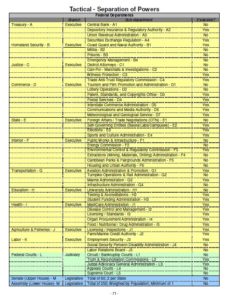
 We all know what that means: an arrested person elects to remain silent so as not to incriminate himself.
We all know what that means: an arrested person elects to remain silent so as not to incriminate himself. Yes, we can …
Yes, we can … As related, Constitutional Law scholars refer to these two amendments as Criminal Proceedings provisions. These are not Rocket Science or Brain Surgery; the cause for justice should not be this complicated.
As related, Constitutional Law scholars refer to these two amendments as Criminal Proceedings provisions. These are not Rocket Science or Brain Surgery; the cause for justice should not be this complicated.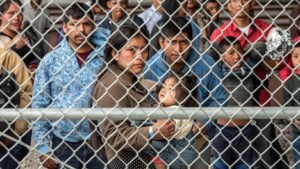
 So many times, governmental institutions – think security forces – abuse their position/strength and exploit the rights and property of ordinary citizens.
So many times, governmental institutions – think security forces – abuse their position/strength and exploit the rights and property of ordinary citizens. 
 We can allow for sanctions and retributions against security forces/justice institutions for procedural violations while still pursuing justice. This approach works in civil proceeding, international peace-keeping and political cases (think impeachment); so there could be some “Solomonic” approach in criminal proceedings – especially when no death penalty is attached. (Ancient Israel King Solomon threatened death to a child in order to ascertain the true identity of the real mother – this proved to be indisputable wisdom).
We can allow for sanctions and retributions against security forces/justice institutions for procedural violations while still pursuing justice. This approach works in civil proceeding, international peace-keeping and political cases (think impeachment); so there could be some “Solomonic” approach in criminal proceedings – especially when no death penalty is attached. (Ancient Israel King Solomon threatened death to a child in order to ascertain the true identity of the real mother – this proved to be indisputable wisdom).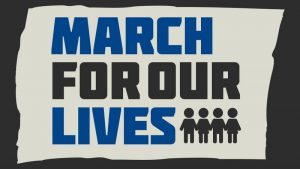
 The “Land of the Free and Home of the Brave” with its laissez-fare attitudes towards gun ownership and stockpiling of lethal weapons is not a positive attribute.
The “Land of the Free and Home of the Brave” with its laissez-fare attitudes towards gun ownership and stockpiling of lethal weapons is not a positive attribute.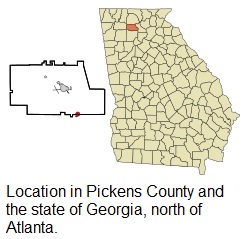

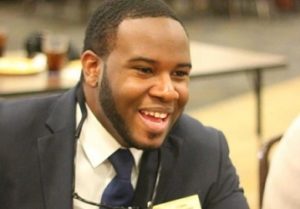

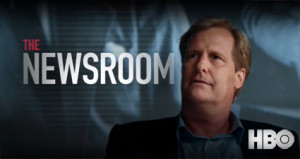 What makes America better?
What makes America better?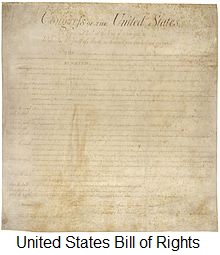
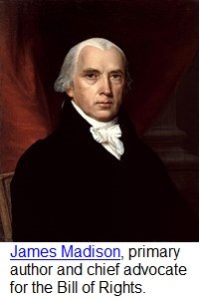 The United States Bill of Rights comprises the first ten
The United States Bill of Rights comprises the first ten 




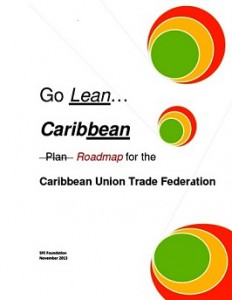

 Today is the Monday closest to October 12 – Day of Discovery by Christopher Columbus – so it is a day set aside as a Holiday in many places. But alas, there have been many communities that have remediated their historical appreciation for Christopher Columbus.
Today is the Monday closest to October 12 – Day of Discovery by Christopher Columbus – so it is a day set aside as a Holiday in many places. But alas, there have been many communities that have remediated their historical appreciation for Christopher Columbus.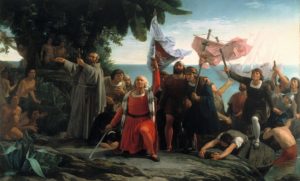
 The United States of America had been a majority White (European) country for its
The United States of America had been a majority White (European) country for its 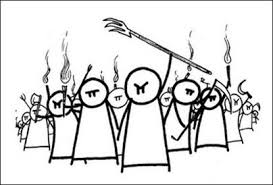
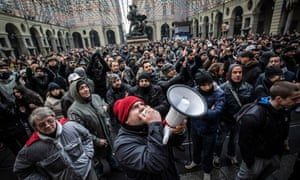

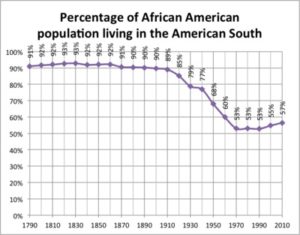 … the movement of 6 million
… the movement of 6 million 
